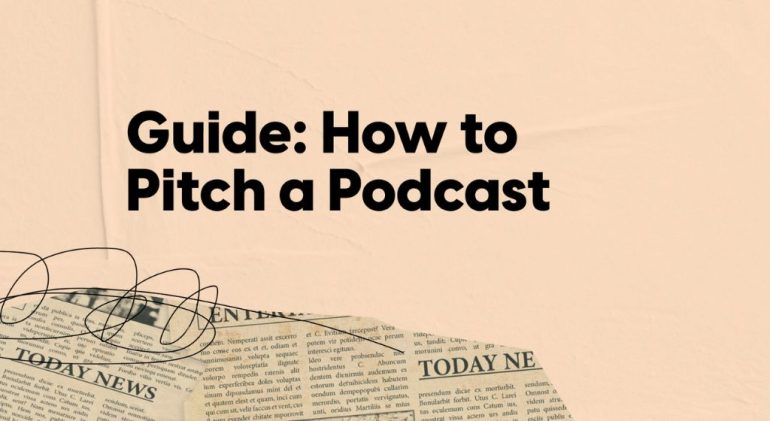With the explosion of podcasting as a mainstream medium, it’s no surprise that public relations professionals, entrepreneurs, and thought leaders are eager to get featured on podcasts.
Unlike traditional media, podcasts offer long-form, intimate storytelling with niche audiences that often trust the host’s recommendations. Whether you’re promoting a brand, a book, a product, or a personal story, podcasts can be a powerful PR tool—if you know how to pitch them correctly.
But podcast pitching is not the same as pitching to journalists. It’s more personal, conversational, and content-driven. To succeed, your pitch must be tailored to the show, valuable to its listeners, and respectful of the host’s time and platform. Here’s how to do it right.
Understand the Podcast Landscape
Before sending a pitch, take the time to understand how the podcast world works. Unlike print or TV media, many podcasts are independently produced. Hosts are often creators, not journalists. They don’t work on newsroom deadlines or editorial calendars, and many manage their own inboxes.
Podcasts vary in tone, format, and audience. Some are interview-based, others are solo commentary or panel discussions. Not all shows accept guest pitches, and even those that do might not be looking for outside guests all the time. Researching the landscape will help you avoid missteps and choose the right opportunities.
Identify the Right Podcasts for Your Message
A great pitch starts with the right fit. Targeting the right podcasts is more important than blasting out mass emails. Ask yourself:
-
Who is my ideal audience?
-
What podcasts does that audience listen to?
-
Does my story or expertise align with the podcast’s theme?
Use directories like Apple Podcasts, Spotify, and Google Podcasts to explore relevant shows. You can also use platforms like Listen Notes or Podchaser to filter by topic, audience size, or host. Don’t overlook smaller, niche podcasts—often these have the most engaged listeners and are more open to fresh voices.
Listen to at least one or two episodes of any podcast before pitching. Pay attention to the host’s style, how they introduce guests, and what kind of stories or advice they seem to enjoy. This will help you craft a pitch that feels custom-made.
Craft a Compelling Subject Line
Your subject line is the first impression. If it doesn’t grab the host’s attention, your email may never be opened. Make your subject line short, specific, and relevant to the podcast’s theme.
Examples:
-
“Pitch: How I Built a 6-Figure Business After Losing My Job – Guest for [Podcast Name]”
-
“Story Idea: From Prison to Purpose – Redemption Story for [Host’s Show]”
-
“Interview Guest Suggestion: AI Trends in Education – Tech Founder Available”
Avoid clickbait or overly vague subject lines like “Podcast Guest Opportunity” or “Collaboration?” Be direct and value-driven.
Personalize Your Pitch Email
Hosts receive many pitches—and the majority are generic. To stand out, personalize your email. Use the host’s name and mention specific episodes you liked or insights you gained from the show.
Here’s a structure that works well:
-
Greeting & Connection: Start with a warm greeting and mention how you found the show or what you enjoyed about it.
“Hi Jamie, I’ve been a fan of your podcast since your episode on burnout recovery with Dr. Shaw—it really resonated with me.”
-
Why You’re Reaching Out: Clearly state your intent—to suggest yourself (or someone else) as a guest.
“I’d love to be considered as a guest for your show to talk about mental resilience and post-trauma growth…”
-
Who You Are & Your Relevance: Introduce yourself briefly and explain why you’d be a good fit for the audience.
“I’m a licensed therapist who specializes in trauma recovery. I also run a non-profit that helps veterans transition to civilian life…”
-
What You’ll Talk About: Suggest a few potential talking points or topics that tie directly to the podcast’s themes.
“Some topics we could cover:
-
How to recognize hidden burnout
-
Why resilience is more than toughness
-
The neuroscience of recovery from trauma”
-
-
Social Proof or Past Media: Mention any previous podcast appearances, articles, or credentials if available.
“I’ve recently been a guest on ‘Mindful Minutes’ and contributed to Psychology Today.”
-
Call to Action: End with a respectful ask or invitation to connect.
“If you think this might be a good fit, I’d love to coordinate a time that works best for you.”
-
Signature: Include your full name, website, social media handles, and any links to relevant content or interviews.

Make It Easy for the Host
Podcast hosts are busy. Make it as easy as possible for them to say yes by being clear, organized, and prepared. Consider including:
-
A short bio (3-5 sentences)
-
A headshot and media-ready images
-
A link to your website or speaker page
-
A scheduling link (like Calendly) to avoid back-and-forth
-
Any audio/video samples to demonstrate speaking skills
You can also attach a one-sheet PDF that outlines who you are, what you offer as a guest, and previous media experiences. But don’t overload the email—keep attachments minimal and optional.

